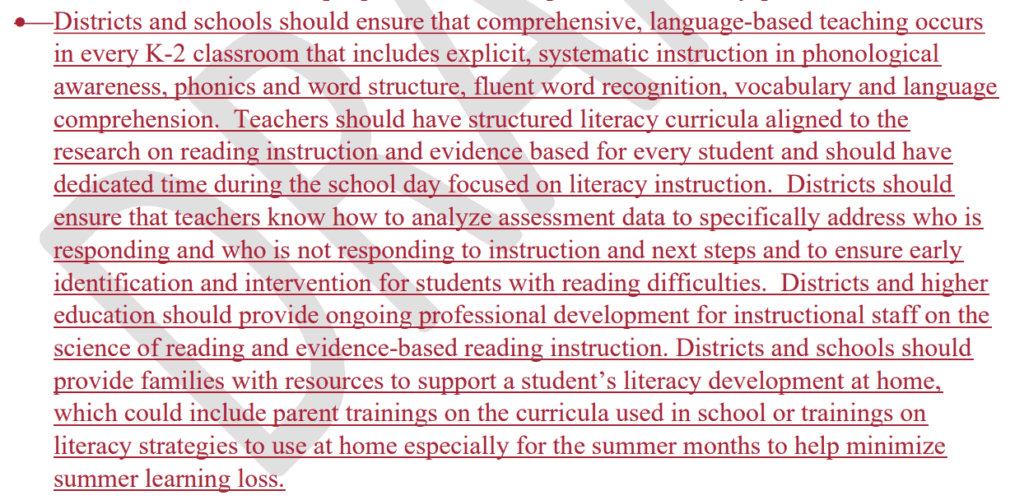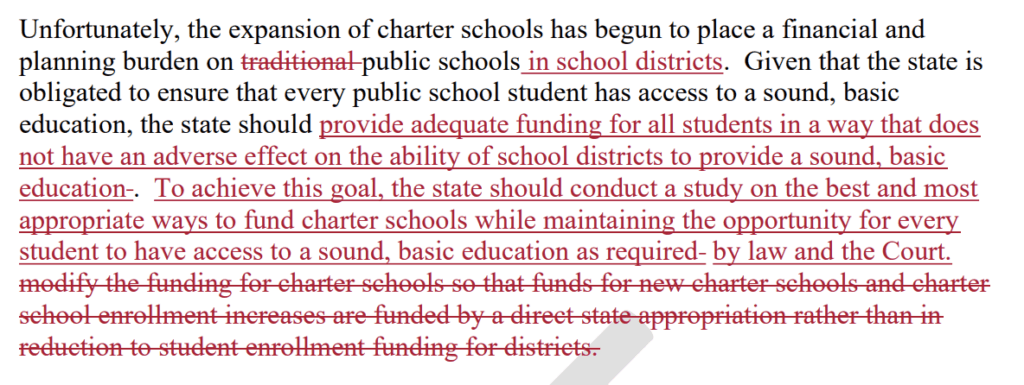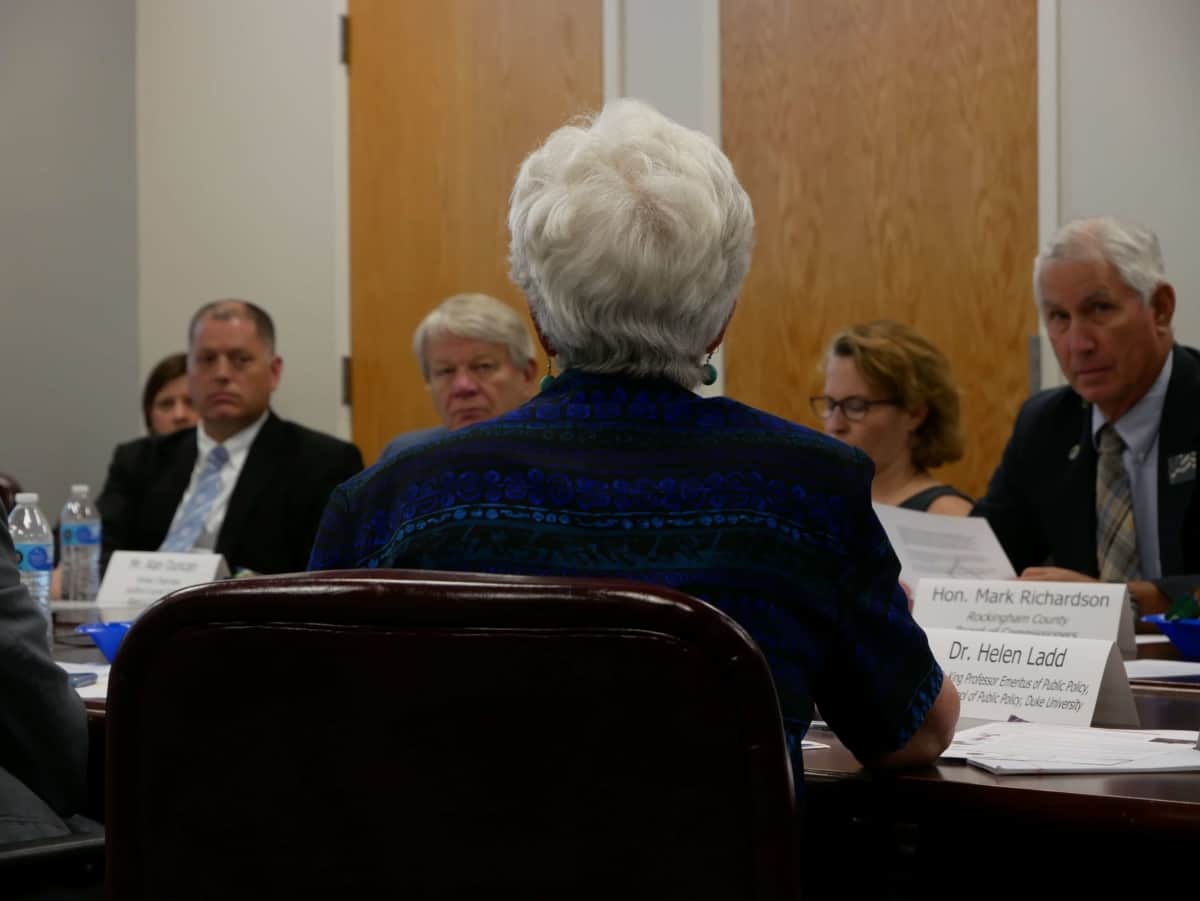The Governor’s Commission on Access to Sound Basic Education, which has worked over the past year and a half to outline how North Carolina should fulfill its obligation to provide equal educational opportunity to all children, is close to landing on final recommendations. Of its five working groups, the commission’s recommendations on the early childhood system are the furthest from complete.
During the commission’s meeting on Monday, members grappled with the specificity, scope, and disjointed nature of the group’s early childhood recommendations.
“In this work group, it did get to be a little bit tricky sometimes, because we are talking about two separate systems,” said Leigh Kokenes, commission member and school psychologist in Wake County Public Schools. “We’re talking about when they enter the K-12 system and then the pre-K… There was a lot of overlap and a lot of division as well.”
In previous court orders throughout the decades-long Leandro lawsuit, which started in 1994 when five low-wealth districts sued the state for failing to provide equal educational quality to their students, the scope of the case has been limited to children four years of age and older.
But the early childhood working group has made most of its recommendations considering students and families from the birth of a child through third grade — a common definition of “early childhood.” Starting to educate and support students at the earliest possible point, members argued, is essential. Leslie Winner — commission member, former executive director of the Z. Smith Reynolds Foundation, and head of the commission’s teacher work group — suggested making this clear in the final report, regardless of the previous scope of the case.
“If you just start at four, you’re not going to get there, and, therefore, we have these additional recommendations,” Winner said.
One detailed addition to the early childhood section on literacy instruction sparked debate on the state’s role in improving students’ reading proficiency and, more broadly, in mandating instruction.


“I don’t think that I’m comfortable with this group making a recommendation at this level of detail without having an opinion one way or another about whether it’s right,” Winner said.
Winner said that even if this combination of instruction practices is evidence-based, new and different research could point to different strategies down the road. Kokenes and Mark Richardson, commission member and Rockingham County commissioner, insisted that the details were important to include.
“If we know that a ticket to poverty is indeed not being able to read by a certain level — and it is — then actually I have to say that I do think people in positions of authority have to say what works and it does have to be pushed down from the top,” Kokenes said. She said the practices in the recommendation are based on strong evidence and that she has seen wide variation of literacy instruction quality in different classrooms.
“If it’s left to schools and if it’s left to people who don’t have all that knowledge to understand what reaches most kids, you could actually have people teaching incorrectly and inadequately over a long period of time,” she said. “I know it might not sound right to have it legislated, but it is what works for a majority of students over time.”
Richardson pointed to a lack of progress in student literacy in recent years. A statewide initiative called Read to Achieve has been in place since 2012 and, earlier this year, was found to have no impact on third grade reading proficiency. Senate Republican leaders, along with a bipartisan group of stakeholders, have crafted legislation to reform that program, which was recently vetoed by Gov. Roy Cooper.
“It’s not only appropriate but necessary,” Richardson said. “We’ve got to do something.”
Richardson added that high-quality preschool instruction has to be followed up with high-quality early elementary instruction. “You have to keep doing that all the way through the third grade or they will lose that advantage that they’ve gained from starting early,” he said.
Find the full draft priorities of the early childhood/”whole child” work group below. Red text indicates added or tweaked language.
Charter school funding, child nutrition support
Within the recommendations outlining how schools should be funded, the finances work group spelled out that the current funding formula is incapable of ensuring every child has access to a sound, basic education.
The group also added a recommendation on charter school funding after a lengthy discussion during the commission’s June meeting on where and how the report should address charter schools.
Leandro commission close to final recommendations on ensuring sound, basic education
The group suggested the state study how charter schools can be funded without negatively impacting traditional public schools.


The group also said the state should provide “robust” funding for infrastructure and capital needs, emphasizing support for low-wealth schools, as well as covering operational expenses. A piece on child nutrition was also added:
“Child nutrition is an integral aspect of a sound basic education and the state should ensure that adequate funding is available to provide access to free breakfast and lunch programs for all students with needs.”
UNC-Chapel Hill Dean of Education Fouad Abd-El-Khalick encouraged the group to consider the need for the state to support local districts and schools in accessing federal funds for nutrition programs. Nick Sojka, commission member and Cumberland County school board attorney, said he has seen how schools can lack capacity in fully utilizing that money.
“We know that we leave federal resources on the table in terms of access to breakfast and also the summer meals program just because we don’t have the local capacity to feed all the kids whether it’s… the way our buildings are set up, the resources inside the facilities during the school day, staff to monitor all those pieces,” Sojka said.
Other edits
The teacher work group worked to nail down a definition of a high-poverty school for the purpose of making sure those who teach in schools with high concentrations of poverty are supported, even if the entire district is not low-wealth.
Helen “Sunny” Ladd, a commission member and Duke University professor of public policy and economics, expressed concern with using the percentage of students who are eligible for free and reduced lunch as a measure for poverty, saying the measure is on its way out nationally. Members decided to leave the definition open to future poverty measures, while sticking with free and reduced lunch in the meantime.
Find the full draft recommendations for the teacher work group below.
Find the full draft recommendations of the principals work group, which had only minor edits at this meeting, below.
The work group focused on assessment and accountability added an introduction that emphasizes the importance of both proficiency and growth as measures of student and school success. The group also includes metrics it says are necessary to consider like chronic absenteeism, school climate, student discipline, graduation rates, and college/career readiness.
The recommendations also explicitly suggest ending the current A-F school grading system, which is based off 80% proficiency and 20% student growth. Critics of the system point to the fact that the school performance grades are heavily correlated with poverty. In Monday’s meeting, members suggested tweaking language to avoid the implication that new grades based on a different calculation should be created. Instead, members agreed that certain measures should simply be publicly available.
Ladd added that a larger question regarding the frequency of tests remains.
“It’s not at all clear to me that we need to test every single student every year,” Ladd said.
Find the full assessment/accountability draft recommendations below.
The commission is waiting to find out when the report from outside consultant WestEd will be made public to determine its remaining timeline. The consultant, hired by Judge David Lee, has been answering similar questions around how the state should meet its constitutional obligation of educational opportunity.
The commission will meet in person or on a call to flesh out its recommendations and again in the fall to hear from WestEd before passing its final recommendations to Gov. Cooper. WestEd’s report has already been given to Lee, who has decided to keep the report private for now, only distributing it to parties involved in the case.



